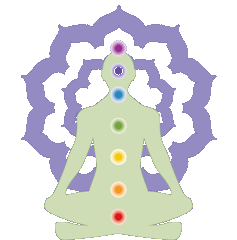When practiced on a regular and frequent basis, Ashtanga yoga has many physical benefits. It can actually slow the resting pulse rate and lower your blood pressure. It can increase the ability of the heart and lungs to deliver oxygen to the muscles, move the anaerobic threshold further away, release toxins from the body, improve overall balance, heighten awareness, build strength without making muscles bulky, increase stamina, and help in regaining lost flexibility.
To increase these benefits, do not practice on a full stomach - this is uncomfortable and will impede your practice! It's also important to be well-hydrated, of course, and the best way to do this is to start when you get out of bed, even if class isn't until the evening. Hydration happens over a period of time, not instantaneously. So it's best to be truly hydrated thoughout the day and ready for practice, rather than having a belly sloshing with water during class :) Some teachers even discourage drinking water right before or during class at all, because they feel this "puts out the fire" that we are trying to build up in the body. But, if you feel thirsty during class, I highly encourage you to listen to your body & compassionately give it what it needs.
If at any time you feel uncomfortable with a pose, don't do it! Flag me down and I will be more than happy to suggest modifications or alternatives. Practicing in a safe, positive, and healthy way is of the utmost importance.
This is probably just a reminder to most of you, but it's good to keep in mind! Every practice is different. Things that feel easy or available one day may not the next. Rather than viewing that as a problem, we use the opportunity to remain present in the moment, check in with the body, and do what's most beneficial in THAT MOMENT.
If you practice on a regular basis, you will see amazing transformations not only in the body, but also in the mind. In fact, one of the greatest mental benefits of yoga is that it allows us to slow the mind down enough to appreciate those slow, sometimes unnoticed transformations with great clarity.
Subscribe to:
Post Comments (Atom)





No comments:
Post a Comment